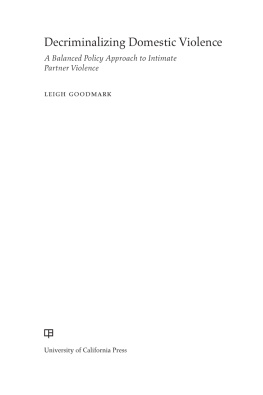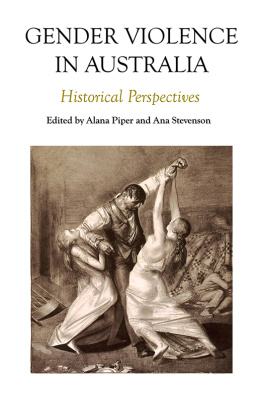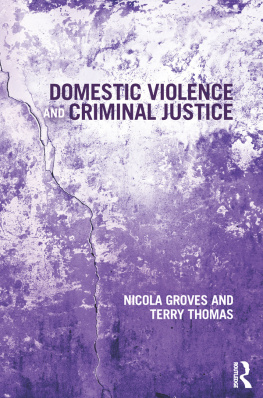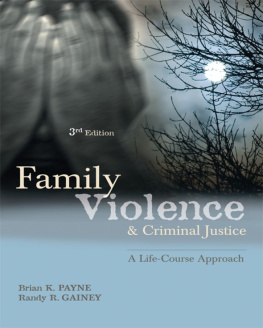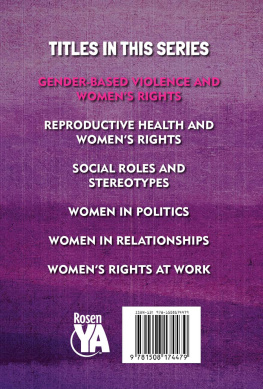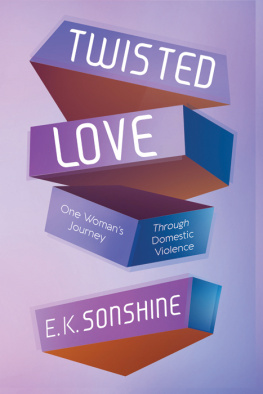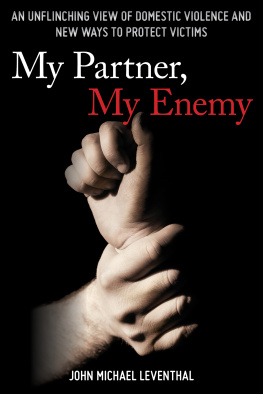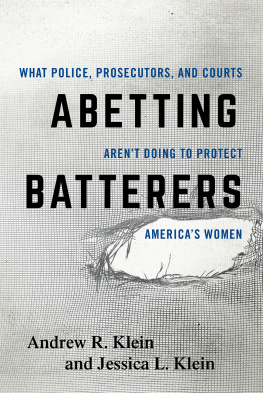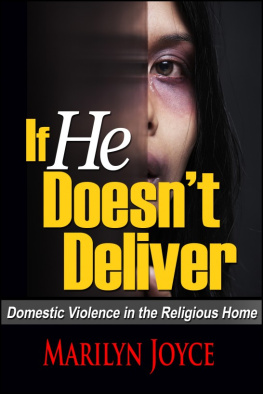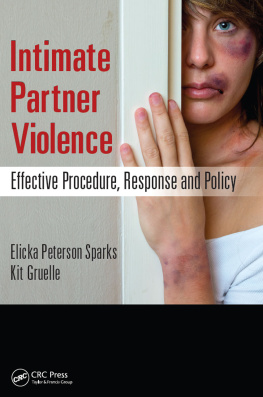Decriminalizing Domestic Violence
GENDER AND JUSTICE
Edited by Claire M. Renzetti
This University of California Press series explores how the experiences of offending, victimization, and justice are profoundly influenced by the intersections of gender with other markers of social location. Cross-cultural and comparative, series volumes publish the best new scholarship that seeks to challenge assumptions, highlight inequalities, and transform practice and policy.
The Trouble with Marriage: Feminists Confront Law and Violence in India, by Srimati Basu
Caught Up: Girls, Surveillance, and Wraparound Incarceration, by Jerry Flores
In Search of Safety: Confronting Inequality in Womens Imprisonment, by Barbara Owen, James Wells, Joycelyn Pollock
Abusive Endings: Separation and Divorce Violence against Women, by Walter S. DeKeseredy, Molly Dragiewicz, and Martin D. Schwartz
Journeys: Resiliency and Growth for Survivors of Intimate Partner Abuse, by Susan L. Miller
The Chosen Ones: Black Men and the Politics of Redemption, by Nikki Jones
Decriminalizing Domestic Violence: A Balanced Policy Approach to Intimate Partner Violence, by Leigh Goodmark
Decriminalizing Domestic Violence
A Balanced Policy Approach to Intimate Partner Violence
LEIGH GOODMARK

University of California Press
University of California Press, one of the most distinguished university presses in the United States, enriches lives around the world by advancing scholarship in the humanities, social sciences, and natural sciences. Its activities are supported by the UC Press Foundation and by philanthropic contributions from individuals and institutions. For more information, visit www.ucpress.edu.
University of California Press
Oakland, California
2018 by The Regents of the University of California
Library of Congress Cataloging-in-Publication Data
Names: Goodmark, Leigh, 1969- author.
Title: Decriminalizing domestic violence : a balanced policy approach to intimate partner violence / Leigh Goodmark.
Description: Oakland, California : University of California Press, [2018] | Includes bibliographical references and index. |
Identifiers: LCCN 2018011165 (print) | LCCN 2018015037 (ebook) | ISBN 9780520968295 (ebook) | ISBN 9780520295568 (cloth : alk. paper) | ISBN 9780520295575 (pbk. : alk. paper)
Subjects: LCSH : Intimate partner violenceUnited States. | Family violenceUnited StatesPrevention.
Classification: LCC HV 6626.2 (ebook) | LCC HV 6626.2 . G 667 2018 (print) | DDC 362.82/925610973dc23
LC record available at https://lccn.loc.gov/2018011165
26 25 24 23 22 21 20 19 18 17
10 9 8 7 6 5 4 3 2 1
For Doug, Juliet, and Carter, as always
There is no such thing as a single-issue struggle because we do not lead single-issue lives.
AUDRE LORDE
Contents
Acknowledgments
On some days, writing a book is a labor of love. On others, its unimaginable torture. And those are the days when youre grateful for the colleagues, friends, and family who provide the support and encouragement you need to keep goingand youre glad that you get the acknowledgments section of your book to thank all of them.
This book would not exist but for Claire Renzetti. Claire is a mentor, a supporter, a dear friend, and my idol. No other individual (in my opinion) has made as significant a contribution to the field of intimate partner violence research and no one else does so with the wisdom, humor, and warmth that Claire brings to every project. Which is why I keep doing projects for Claire, and why I will be fully employed (by her) for the next several years. Thank you so much, Claire.
Maura Roessner was enthusiastic about this idea from the first time we talked over coffee, and didnt blink (okay, maybe she blinked a little) when I told her the title. Her support of this project and her encouragement have been invaluable to me.
Thanks to the cohort of colleagues and friends who continue to push the envelope on the relationship of law to gender-based violence: Donna Coker, Deborah Weissman, Julie Goldscheid, Aya Gruber, Aziza Ahmed, Carrie Bettinger-Lopez, Brenda Smith, Margaret Johnson, Joanne Belknap, and Angela Harris. Thanks also to my restorative justice friends, particularly Gale Burford. I couldnt write a book entitled Decriminalizing Domestic Violence without expecting some serious pushback, and your work, as well as your comments and critiques both on this book and on the articles that preceded it, have helped me to develop an argument that (hopefully) will withstand that criticism and offer something valuable to the conversation. Im grateful for the benefit of your insights.
I am unbelievably lucky to be teaching at the University of Maryland Francis King Carey School of Law. Thanks to all of my colleagues, but particularly Dean Donald Tobin and clinic codirectors Michael Pinard and Rene Hutchins, for their encouragement and support. My research assistants, Neda Saghafi and Chelsea Van Orden, fielded every bizarre request with alacrity and good humor and provided invaluable feedback. They are both going to be amazing attorneys, and Im proud to have worked with them.
Parts of this book were adapted from law review articles that appeared in the Harvard Journal of Law and Gender and the Florida State University Law Review. Thanks so much to the student editors of those journals for their input and ideas.
Like many people who are passionate about what they do, I tend to bring my work home. Which means that my family has heard enough about gender-based violence to last them a lifetime. Thanks to Doug for twenty-five years of love, support, and editing, for being willing to single parent both at home and abroad so that I can learn and work with advocates around the world, for your sense of humor, and for the thousands of things that you do to make our lives better. And to my children, Juliet and Carter, who have sat through trainings and court and lectures and been in many places that caused people to question my parenting, thank you for being the amazing people that you are. I am in awe of you every day. I can only do this work and stay happy and relatively sane because of the three of you, and I love you dearly.
Introduction
For the last thirty years, the United States has relied primarily on one tool to combat intimate partner violencethe criminal legal system. This book argues for taking a different path, one that incorporates economic, public health, community, and human rights policies. Decriminalizing domestic violencedeemphasizing the criminal legal systems role in responding to intimate partner violencewill enable the United States to develop a multifaceted and, ultimately, more effective policy approach.
This story begins with women like this one:
I said no more when I got punched and had hair pulled out; there were big clumps in my hands. He threw chairs at me. I remember being on the floor screaming. It was a nightmare....
I ran to my neighbor. She let me in which is amazing. He banged and screamed on her door until the police came twenty minutes later....
The police arrived and said, Did anything happen? The house was in pieces; chairs were broken everywhere, and my hair was out of my head, hanging on my shoulder, and the cop said, It looks like nothing happened.
Criminal laws that could have been used to address intimate partner violence had always existed, but by the 1970s those laws were inconsistently enforced in the context of intimate relationships. As one woman recounted, [E]verytime I went to the authorities, they laughed at me stating that they, the law, would have to see my husband kill one of us before they could help.
Next page
